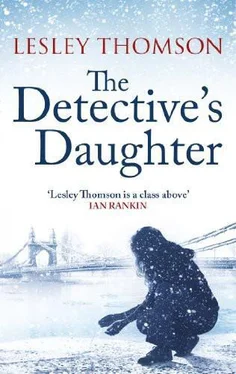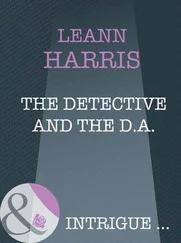Lesley Thomson
THE DETECTIVE’S DAUGHTER
‘To walk is to lack a site.’
‘Practices of Space’, Michel de Certeau
Above a pond,
An unseen filament
Of spider’s floss
Suspends a slowly
Spinning leaf.
‘Dark Matter’
A Responsibility to Awe , Rebecca Elson
Monday, 27 July 1981
‘Jonny!’
Kate Rokesmith heard no sound from three floors up where, insisting that his new toy come on their walk and despite her efforts to dissuade him, Jonathan had gone to fetch the steam engine from his bedroom. She took a silver cigarette case from her jacket pocket, flipped it open, snapped it shut, put it back.
Where was he?
She rearranged her scarf, welcoming the cool silk against her skin in the stuffy heat. She would have to confess that the prized engine was scratched and flecked with crustaceans best not examined. At breakfast she had appreciated her little boy’s creativity when he poked Shreddies through the cab window and trickled milk down the funnel; she had made only feeble efforts to stop him. Although she had kept Jon away while the spare room was decorated, somehow plaster dust had crept in around the wheel axles and, once moistened with spoonings of milk, had set hard. At least the wheels still turned. It was not a good idea for Jon to bring the 1950s Triang steam engine to the river.
Kate had ducked out of her mother-in-law’s birthday lunch on the pretext of a headache. Time had not secured either Mrs Rokesmith a toehold towards intimacy. Kate appeared to the older woman listless and entirely wrong as the spouse of an established civil engineer. Hugh Rokesmith’s mother was fond of the ‘idea’ of her grandson, but found his full-tilt reality irksome. Outside work, Hugh shirked the role of mediator and did nothing to encourage a rapprochement between his mother and his wife; Kate’s decision to stay at home with Jonathan suited them all.
As soon as Hugh had driven off, Kate told her son they must have fresh air so would go to the river.
She caught her foot on a kilim spread across the spacious hall floor and stooping to smooth it hit her forehead on the marble edge of the table. Tears welled as the pain exploded and she pummelled her scalp furiously.
‘Jonathan. Hurry up!’
No answer.
Once by the river, she told herself, Jonathan would abandon the engine in favour of dagger-shaped stones, snakes of rope and leaves and twigs that would end up in his duvet or stuffed in his toy-box.
His mother’s systematic disposal of his treasures was to the little boy a betrayal that he could not articulate.
Kate wandered through to the dining room. It smelled of polish. They seldom entertained: she was no cook. Hugh met his clients in restaurants. The room had become his impromptu study. Papers and technical drawings were laid out on the table that she and Jonathan were under strict orders not to touch. In one corner was an upright Kemble piano that Hugh had bought Kate for her twenty-first birthday three years before. The lid was up, a book of Beethoven Sonatas open at the ‘Pathétique’. This was Jonathan’s favourite and his mother knew it by heart.
Standing at the instrument, Kate played the opening bars of the Adagio cantabile. Perhaps she hoped Jonathan might be lured down by the poignant melody, the notes rich and mellow in the high-ceilinged room, but he did not come.
She returned to the hall and absently tapped out the tune on the balustrade; she pictured him crouched in her wardrobe, hands clamped over his eyes, his face buried in her coat; a new game that culminated in spectacular tantrums when she would not play with him.
The tide would be coming in.
The air in the house was still. Plaster dust lingered, making her skin feel dry and papery.
‘Jonathan! Last chance or I’m leaving you all alone.’
No answer.
If he were here, Hugh would have stormed upstairs to fetch him; used to assessing risk, he would assume his son was hurt or systematically damaging something. Kate craned up the stairwell to the topmost landing and met the cantankerous eyes of Brunel, the adopted stray cat. Jon wasn’t there.
She peered in the oval mirror. It was spotted with silver, but she could examine the cut on her forehead, delicately dabbing at beads of blood, wincing when it stung. She had attempted to divert Jon’s attention by giving him her good luck amulet, but he had been unimpressed and plonked it on the hall table.
In the suspended quiet, the tick-tock of the ancestral grandfather clock, a faithless presence in its sombre ebony case, marked time. She heard a noise from above; it would be the cat.
With the blood wiped away, the wound was faint.
‘Here he is!’ Jonathan Rokesmith had developed a trick of speaking about himself in the third person. Hugh said it avoided taking responsibility for his actions. Kate found it strange.
‘Sweetheart, at last!’
She reached out to her son who was stumping downstairs in blue wellington boots instead of the sandals she had put him in. A graze on his knee had practically healed; the skin a livid pink against his toasty brown tan. He would have a scar, despite her attempts to stop him picking at the wound.
Sturdy, compact and red-cheeked, Jonathan Justin Rokesmith, with his choppy shock of hair, fine blond like his mother’s, a kitchen-scissors fringe flicking over one eye, was charmingly oblivious that he had delayed their expedition. The four-year-old waved the illegal engine aloft, making choo-choo noises as, left foot first, he took each stair with reckless intent, sure that his mummy would catch him should he topple.
‘Are you my special man?’ Kate pushed her palm against Jon’s chest forcing him to halt. He grinned, shying from her looming kiss. Abruptly she let him go and he stumbled before regaining balance.
As Kate and her son came out of 47 St Peter’s Square, the next-door neighbour Professor Ramsay was climbing out of his vintage Rover, a car that Hugh and Jonathan coveted. He paused on the pavement to mime approval at Jonathan in his boots and billowing He-Man and the Masters of the Universe T-shirt, military marching down the path. Kate shrugged her shoulders in a show of helpless pride. In sunglasses, tight-fitting trousers and shirt that flattered her, she might have turned heads, but that day the streets, bleached by relentless sunshine, were deserted and there was only Mark Ramsay to appreciate her.
A world expert in Parkinson’s disease, the professor was busy, so Kate did not expect conversation. His wife was less predictable; Isabel Ramsay might initiate chat, give a stern nod or appear not to see Kate at all. If it was a ‘talking day’ this would involve eulogies about rambles with her ‘gorgeous baby Lucian’. Her stories – garnished with sentiment and bread for ducks – lacked the blood, mud and bruises of Kate’s outings with Jonathan. Isabel Ramsay spoke as if her children were young; in fact Lucian, brisk in brogues and chinos, was about Kate’s age and not, she thought, gorgeous. He must always have been impeccable and obedient – unlike her own child.
Hugh had once remarked that the Ramsays had been glamorous sixties people, appearing in gossip columns and throwing parties for friends in high places until some scandal. Her husband’s eye for detail did not extend to humans so he could only hazard that one of the kids had got into a scrape involving a girl. Kate decided it was Lucian: the quiet ones were trouble. As Jon chattered confidentially to his toys or constructed tunnels from stones and twigs, she was grateful he had the imagination to misbehave.
Читать дальше












